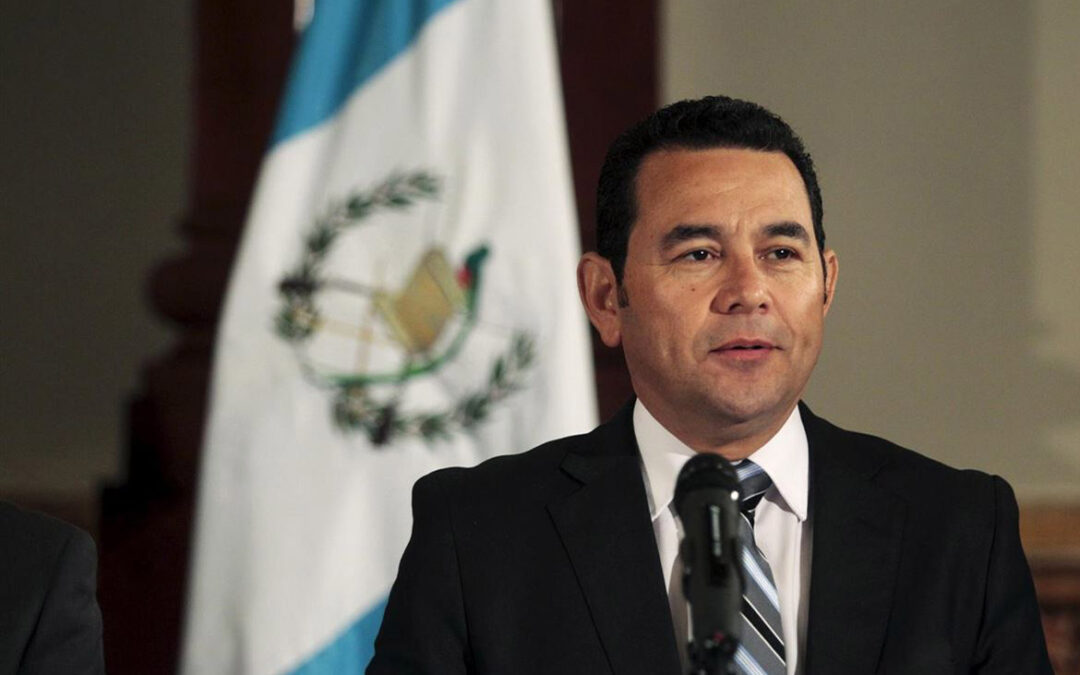
Jan 18, 2018 | Artículos, Noticias
La CIJ está hondamente preocupada por los últimos actos del poder ejecutivo y del Congreso de la República, que atentan contra la vigencia del estado de derecho y de los derechos humanos en Guatemala.
“Las autoridades del Estado de Guatemala al más alto nivel están implementando una política exterior fundamentada en una errónea interpretación de la soberanía nacional y en el absoluto desprecio por el derecho internacional de los derechos humanos, todo ello para defender los intereses personales de funcionarios de los tres poderes del Estado y así hacer prevalecer el sistema de impunidad que ha existido en el país, en las últimas décadas. Todo ello es parte del Pacto de Corrupción e Impunidad que existe en el país y que proviene de las autoridades al más alto nivel.”, declaró Ramón Cadena, Director de la CIJ para Centro América.
Por ende, y con fundamento en la Convención Interamericana contra la Corrupción y la Convención Americana sobre Derechos Humanos, la CIJ hace un llamado a la Comisión Interamericana de Derechos Humanos para que envíe una misión al país, con el mandato de investigar la existencia de este Pacto de Corrupción e Impunidad y evitar así, que avance y cause un grave daño irreparable a la democracia y al pueblo de Guatemala.
Asímismo, con fundamento en la Convención de Naciones Unidas contra la Corrupción, urge a la Representante Residente del Sistema de Naciones Unidas, a tomar las medidas adecuadas para evitar que continúe avanzando dicho pacto.
El Presidente Jimmy Morales (foto) declaró sin ningún fundamento, persona non grata al Comisionado de la Comisión Internacional contra la Impunidad en Guatemala (CICIG), Sr. Iván Velásquez; posteriormente, diputados y diputadas del Congreso de la República intentaron reformar el Código Penal; recientemente, el Superintendente de la Secretaría de Administración Tributaria (SAT) fue removido de su cargo; se han registrado intentos de destituir ilegalmente al Procurador de los Derechos Humanos por parte del Congreso de la República, ya que dicho funcionario ha cumplido con su mandato según la ley; el Presidente de la República está intentando modificar el mandato de la CICIG y/o expulsar al Comisionado Iván Velásquez del país. Estos gravísimos hechos demuestran que las autoridades del Estado de Guatemala, pretenden menoscabar el funcionamiento de la administración pública y promover la impunidad de sus actos.
Por medio de la negociación de la paz y con fundamento en el derecho humano a la paz, el Estado de Guatemala asumió el compromiso de reformar, fortalecer y modernizar la gestión pública, en procura de un manejo transparente y honrado en el uso de los recursos públicos, como condición para lograr que la administración pública tenga la capacidad de cumplir con el supremo deber impuesto al Estado de Guatemala por la Constitución Política, de garantizar a los habitantes del país el bien común.
La CIJ recuerda que es un principio aceptado nacional e internacionalmente, que le está prohibido a las autoridades en cualquier nivel, utilizar el poder que le confiere el ejercicio del cargo o empleo en las entidades del Estado, autónomas o descentralizadas, de participar o influir en la toma de decisiones en beneficio personal o de tercero. Hacerlo atenta en contra de la democracia y del estado de derecho.
El abuso de poder en el ejercicio de la función pública socava las bases del estado de derecho y constituye un acto ilícito, contrario a la Constitución, que debe ser investigado y castigado por las autoridades de justicia con prontitud.
De lo contrario, si no se toman ahora las medidas legales adecuadas, para detener la imposición del Pacto de Corrupción e Impunidad que las autoridades al más alto nivel vienen impulsando, las consecuencias pueden llegar a ser de una magnitud y consecuencias irreparables, causando graves daños a la población guatemalteca y al estado de derecho en Guatemala.
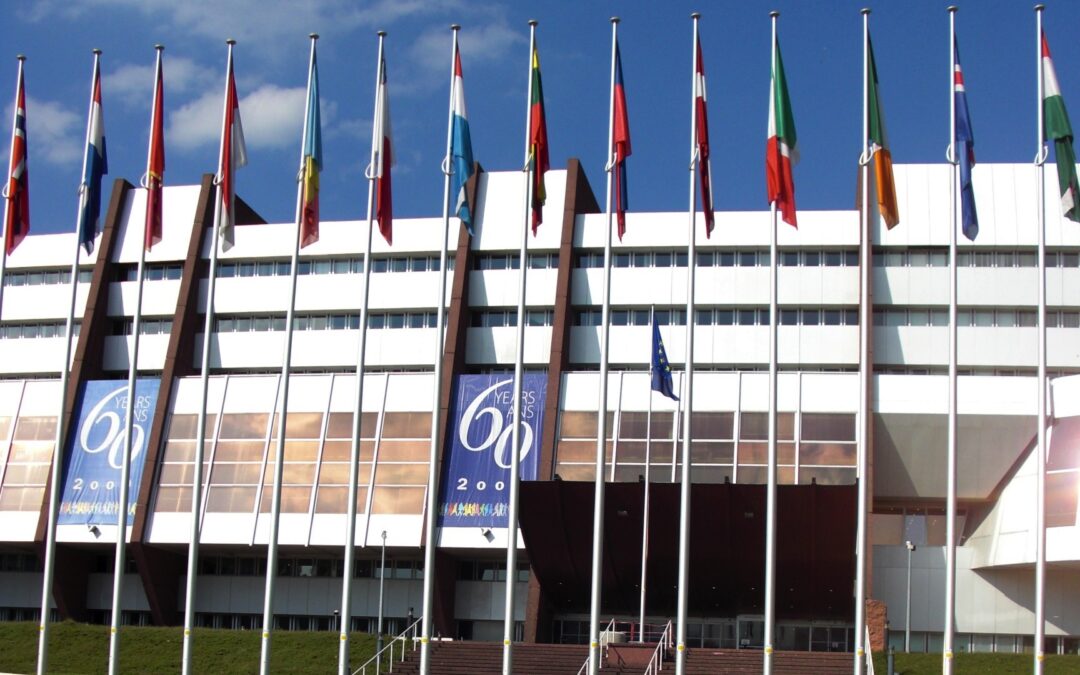
Oct 31, 2017
The ICJ presented a submission on the systems of extradition, expulsion and abductions of the Russian Federation to the Committee of Ministers of the Council of Europe.
The submission was presented for the consideration by the Committee of Ministers of the Council of Europe on the implementation by the Russian Federation of a series of judgments of the European Court of Human Rights in the group of cases Garabayev v. Russia and others.
In particular, the ICJ presented its recent findings in the report Transnational Injustices – National Security Transfers and International Law that provides the most recent assessment of the systems of extradition, expulsion and abduction/rendition of the Russian Federation and States in Central Asia compared with the laws and practices in this field of EU Member States and the US rendition system.
The ICJ submission refers to the lack of compliance by the Russian Federation with the judgments of the European Court of Human Rights with regard to the respect of the principle of non-refoulement (articles 3 ECHR), the lack of effective remedy against violations of this principle (article 3 and 13 ECHR), as well as the lack of compliance with the Court’s interim measures (article 34 ECHR).
Russian Federation-Garabaev-Transfer-Shortcomings-Advocacy-Legal submissions-2017-ENG (Download the submission)
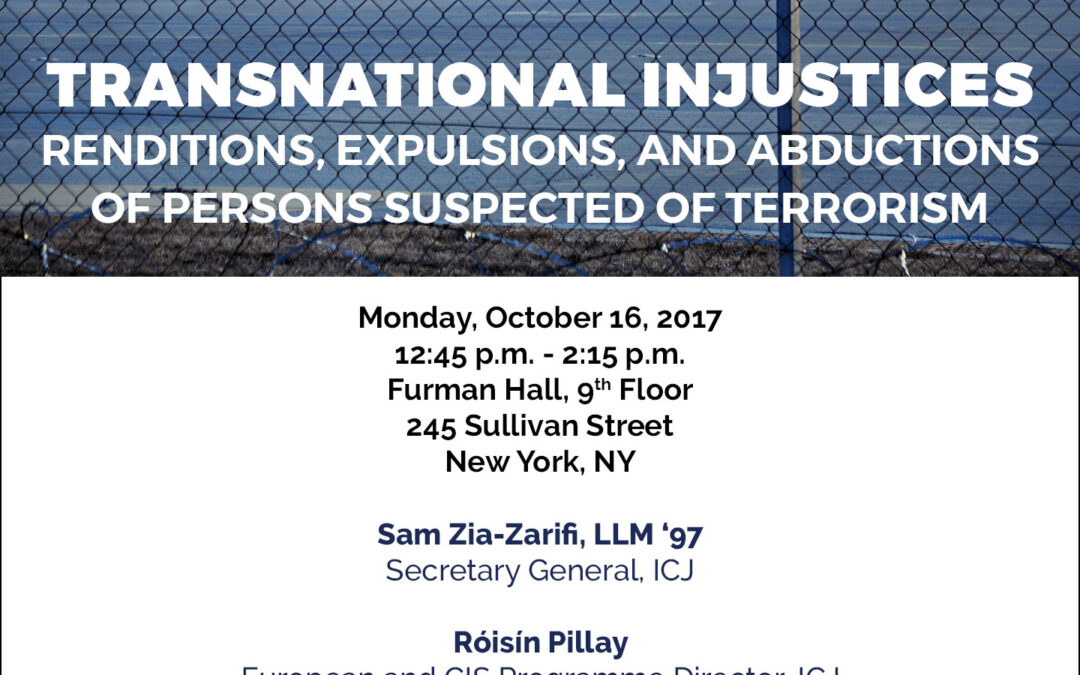
Oct 9, 2017 | Events, News
The ICJ, the Center for Human Rights and Global Justice and Amnesty International invite you today to an event to discuss challenges in prevention of, and accountability for, violations of human rights in the US-led rendition system, and in transfers of suspects in the CIS region.
Join us for a moderated discussion marking the U.S. launch of the International Commission of Jurists’ report, Transnational Injustices: National Security Transfers and International Law.
Panelists will discuss the ongoing practice of states unlawfully rendering people accused of terrorism, particularly in Russia and Central Asia, and explore the extent to which the impact of the CIA’s notorious extraordinary renditions can still be felt today.
When: Monday, October 16, 2017 – 12:45 pm to 2:15 pm
Where: Lester Pollack Colloquium Room – Furman Hall, 9th Floor, NYU School of Law – 245 Sullivan Street, New York City
RSVP here
Refreshments will be served
Speakers:
- Sam Zia-Zarifi, Secretary General, ICJ
- Róisín Pillay, European and CIS Programme Director, ICJ
- Margaret Satterthwaite, JD ’99, Professor of Clinical Law, NYU School of Law
Moderated by Julia Hall, Expert on Counter-Terrorism and Human Rights, Amnesty International
A flyer for this event is available in PDF format by clicking here.
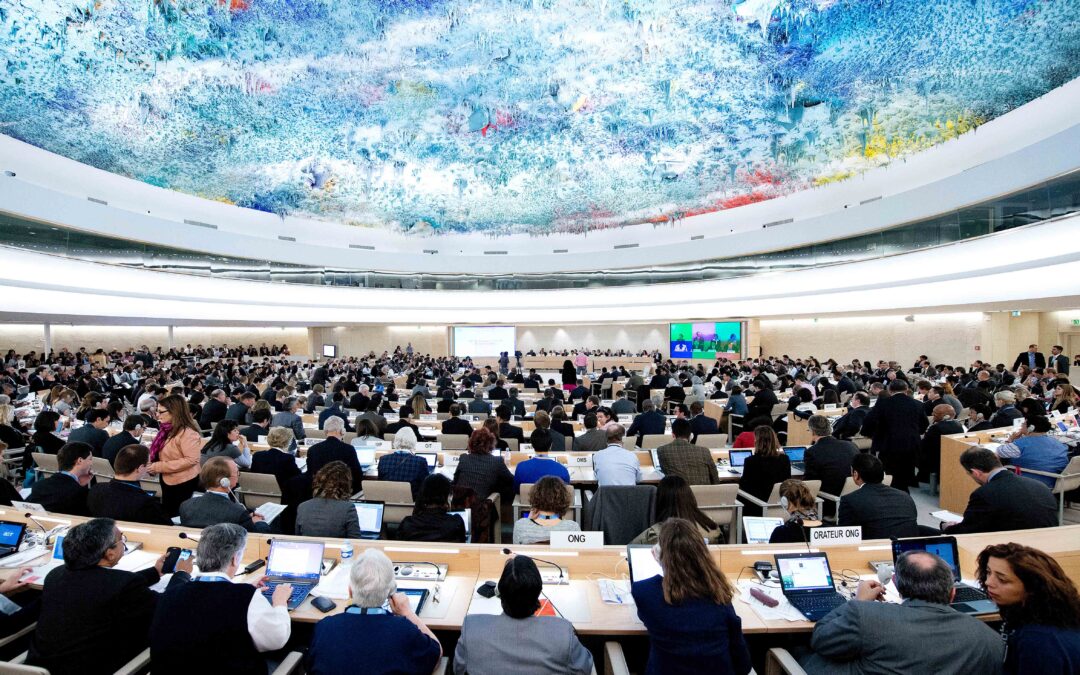
Sep 21, 2017 | Advocacy, Non-legal submissions
Speaking at the UN today, the ICJ called on India to reconsider its refusal to accept recommendations for decriminalisation of consensusal same-sex relations, abolition of the death penalty, and ensuring accountability for human rights violations.
The oral statement was made during the consideration by the UN Human Rights Council of the outcome of India’s Universal Periodic Review (UPR) process. It read as follows:
“The International Commission of Jurists (ICJ) regrets that India has not supported recommendations related to decriminalizing consensual same-sex relations, abolishing the death penalty, and combatting impunity for serious human rights violations.
The ICJ has documented how by allowing the criminalization of consensual same-sex relations, section 377 of the Indian Penal Code has facilitated numerous human rights violations, including violations of the principle of non-discrimination and the rights to equality before the law and equal protection of the law, liberty and security of person, freedom of expression, health, and privacy. Section 377 has also perpetuated homophobic and transphobic attitudes in India, leading to discrimination and violence against LGBT individuals.
The Government has also failed to take steps to combat impunity for serious human rights violations such as extrajudicial killings, enforced disappearances, and torture and other ill treatment, which are facilitated by laws such as the Armed Forces Special Powers Act (AFSPA) and other national security and public safety legislation. Despite repeated commitments to do so, India has also not enacted legislation to recognize torture as a distinct, autonomous offence in its penal code.
The ICJ therefore urges the Government to reconsider, accept and implement UPR recommendations to:
- Decriminalize consensual same-sex sexual relations (161.71, 161.76, 161.77, 161.78, 161.79);
- Enact legislation consistent with the Supreme Court’s recognition of the rights of transgender persons and international human rights standards (161.80);
- Repeal AFSPA and other state and central level laws that similarly violate international human rights law (161.97, 161.248, 161.249);
- Become a party to the CAT; OPCAT; the Second OP to the ICCPR; the ICPPED and other international instruments (161.13, 161.15, 161.29, 161.30, 161.31); and
- Establish a moratorium on the use of the death penalty, with a view towards its abolition (161.104 – 161.115).”
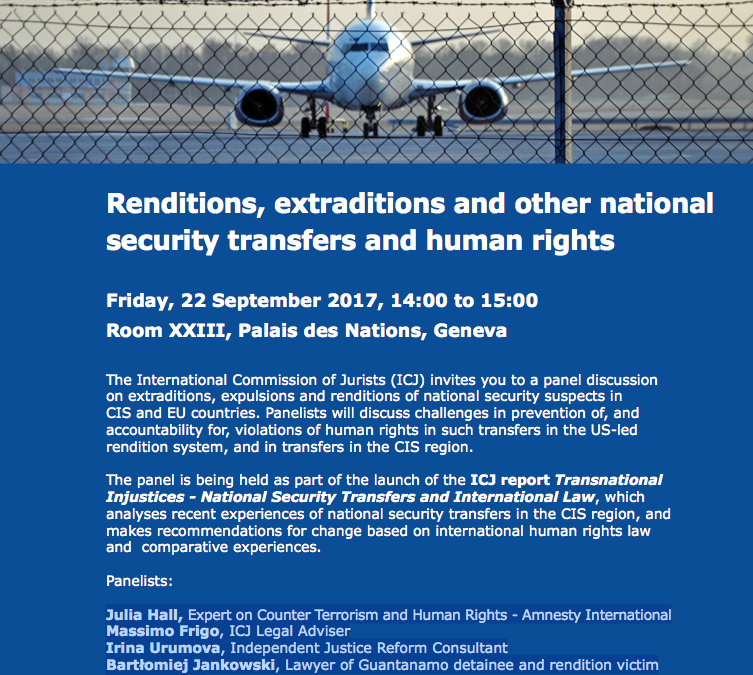
Sep 21, 2017 | Events, News
At a side event to the UN Human Rights Council on 22 September, the ICJ will discuss challenges in prevention of, and accountability for, violations of human rights in the US-led rendition system, and in the CIS region.
The event will address as well the challenges of extraditions, expulsions and renditions of national security suspects in CIS and EU countries.
The panel discussion is being held as part of the launch of the ICJ report Transnational Injustices – National Security Transfers and International Law, which analyses recent experiences of national security transfers in the CIS region, and makes recommendations for change based on international human rights law and comparative experiences.
The event will take place at the UN Human Rights Council in Geneva on Friday 22 September at 14:00 – 15:00 at Room no. XXIII.
Panelists:
- Julia Hall, Expert on Counter Terrorism and Human Rights – Amnesty International
- Bartłomiej Jankowski, Lawyer of Guantanamo detainee and rendition victim Abu Zubaydah
- Massimo Frigo, ICJ Legal Adviser
- Irina Urumova, Independent Justice Reform Consultant
Copies of the report in English will be available for the persons attending the meeting.
A flyer for this event is available in PDF format by clicking here.
For more information, contact massimo.frigo(a)icj.org and/or un(a)icj.org









